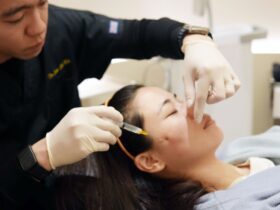Do you have it? Can you prevent it?
By Samantha Francis
Think sensitive skin and flaky, unsightly red patches might come to mind. Or, friends who reel in horror when you’re about to pick up a beauty product you’ve never tried before — cue “Are you sure this is okay for your face?!”
To clear the air once and for all, we spoke to Dr Rene Rust, Senior Director, Expert Science of Global Consumer Skin Health at GlaxoSmithKline. He spills the beans on what constitutes sensitive skin, how you can care for your sensitive skin and more.
P.S. This skin condition is more common than you think!

Dr Rene was in town for the 22d Regional Conference of Dermatology (Asian-Australasian), held from 21 – 24 April.
1. What on earth is sensitive skin?
Dry and sensitive skin can be categorised as a skin type as well as a skin condition. It can be attributed to both genetics as well as the skin’s exposure to various triggers over time.
Facial irritation, level of skin reactivity, redness, heat and stinging sensations are attributed to the level of skin sensitivity.
2. Hmm how do I know if I have sensitive skin?
Sensitive skin is often also called “reactive skin” because it has the tendency to break out frequently as a reaction to internal or external triggers. Irritation or discomfort are frequent signs of sensitive skin as well as slight red patches, areas of excessive dryness, itch, tightness or a stinging sensation.
3. What are 4 must-have beauty/skincare products for people with sensitive skin and why?
I typically recommend that people with sensitive skin use hypoallergenic products designed for their skin type. They should also try to prevent using too many different skincare or cosmetic products, and keep switching products to a minimum.
Must-have products include Physiogel Calming Relief Face Cream ($37.90) and Physiogel Calming Relief Gentle Cream Cleanser ($29.90) from the Physiogel Calming Relief Face care range. They are hypoallergenic and specially formulated with Physiogel BioMimic Technology, which contains an advanced complex of essential lipids.

One in two women in Asia suffer from skin-sensitivity, with one in three women experiencing facial redness.
4. How common is sensitive skin as a condition?
We recently conducted a large scale Skincare Asia study with 8,000 women across nine countries for Physioge. This research revealed that one in two women in Asia suffer from skin-sensitivity, with one in three women experiencing facial redness.
5. With the haze coming back to Singapore, how can one nourish the skin and protect it from pollutants?
Rule No.1 is to avoid negative factors such as pollutants as much as possible — stay inside when pollution is bad, and protect your skin from exposure to the elements by using sunscreens, or hats, clothing.
Always ensure that your skin is properly hydrated with appropriate and effective products, ideally with a hypoallergenic skin care regimen that has tailored products for day-time and night-time use.
The Physiogel Calming Relief Face Care range is available exclusively at Watsons.
ADVERTISEMENTS










Leave a Reply